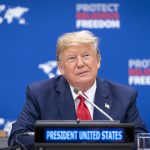President-elect Donald Trump has set the geopolitical stage ablaze yet again, raising eyebrows—and heart rates—around the world with his bold proclamation that military force may not be off the table when it comes to regaining control of the Panama Canal. This mouthwatering morsel comes on the heels of his concerns over Chinese encroachment on the vital waterway, which he claims is being manipulated to the detriment of American shipping interests.
For Trump, the canal isn’t just an ornament adorning the map; it’s a vital artery for trade and security. His assertion that Chinese interests are “ripping off” U.S. ships in this interoceanic passage echoes the long-standing concerns many conservatives have harbored about Beijing’s influence in the Western Hemisphere. Meanwhile, Ricarte Vásquez Morales, the head honcho of the Panama Canal Authority, has sprung into damage control mode, adamantly denying claims of Chinese control over the canal. It’s almost as if he pulled out the ol’ “It’s not you, it’s me” line but for geopolitics. He claims that any preferential treatment would lead to chaos—perhaps a Freudian slip suggesting that chaos is already lurking just beneath the surface.
While the specifics of Trump’s claims regarding direct Chinese military influence over canal operations may be a tad exaggerated, one thing is certain: the general idea that China has its hands dirty in the canal’s operations is not unfounded. Experts and government reports have pointed to the escalating Chinese presence as a threat not just to Panama’s sovereignty but to U.S. interests at large. Thanks to the Belt and Road Initiative—a multi-billion dollar brainchild of the Chinese Communist Party—Panama is now firmly in China’s sights, having been the first Latin American accomplice to sign on in 2018.
The United States should be taking notice, especially given that the Panama Canal was once fully under American control until the 1977 negotiations spearheaded by Jimmy Carter, which eventually relinquished control to Panama in 1999. The U.S. had shouldered a financial burden of $375 million (that’s $15 billion in today’s money) just to construct the canal. Fast forward to 2024, and the lesson seems to be that giving away something of strategic value doesn’t come without repercussions.
Additionally, a cargo ship navigating the Agua Clara Locks is now surrounded by not just water, but also the rising specter of Chinese intelligence-gathering through their operations at the canal’s entrances. The House Foreign Affairs Committee has issued stern warnings about the growing Chinese influence in Central America, essentially giving a big thumbs-down to any relaxed attitude regarding our Southern neighbor. If the odds of trade obstruction or surveillance threats emerge from this, it’s enough to make any American shudder.
China influence over Panama Canal has been a US concern for years https://t.co/N7VIUPb39g
— Washington Examiner (@dcexaminer) January 12, 2025
In a voice seemingly lost in the wind, Democratic leaders raised their eyebrows at Trump’s military musings about the Panama Canal, branding the idea ludicrous. However, some Republican lawmakers are taking the issue seriously. Representative Dusty Johnson from South Dakota has recently introduced a bill that would give Trump the go-ahead to negotiate for reacquisition of the canal. He believes that recovering this piece of land could be a stepping stone toward ensuring American strength and security on the global stage.
In the grand scheme of things, whether or not one harbors an opinion on this bold plan, it’s evident that Trump is neither shying away from confrontation nor letting China simply march further into America’s backyard. While Democrats may laugh off Trump’s musings as mere rhetoric, the reality is that the stakes are high, and the Panama Canal remains a pivotal battleground in the struggle for global influence.




